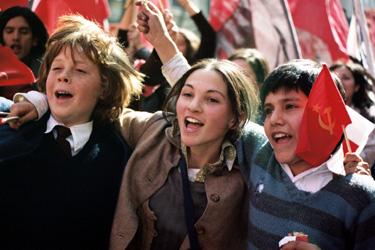|
Reviews of Recent Independent, Foreign, & Documentary Films in Theaters and DVD/Home Video
MACHUCA
On September 11, 1973, the Chilean socialist government of Salvador Allende was overthrown
by the military, a coup supported by the elite upper class. Violent and bloody, its consequences
are still felt today. Through a common theme – the coming-of-age of two friends from the
opposite side of the tracks - director Andrés Wood delivers a powerful film through small,
strategic details.
Based on his own experience as a child, Wood sets his film in a private bilingual school where
the well-meaning headmaster, Father McEnroe (Ernesto Malbrán), has decided to do the
unthinkable: bring some boys from the slums on scholarship and integrate them with the children
of the ruling class, which includes Gonzalo (Matías Quer). Predictably, tension builds up,
and many of the students show hostility towards Machuca (Ariel Mateluna), a boy from the
slums.
But Machuca, though scared, is not intimidated. He has a backbone, unlike Gonzalo, who is
unable to express his anger at his parents or the bullies at school. Machuca opens
up a different world to Gonzalo, who sees the slums for the first time in his life. There he meets Silvana (Manuela Martelli), Machuca’s neighbor, and
with her begins sexually experimenting. Quer and Mateluna play their roles with naturalness and
flair, and the grown-ups are vivid, though not stereotyped, portraits of their class and time.
Yet the growing tension, both political and interpersonal, is felt in various
ways: in the rising violence of the demonstrations; and in the words of Machuca’s drunk
father, who dismisses his son’s friendship as pointless, saying years later Gonzalo will have
money and power while Machuca will still be cleaning toilets.
Machuca is vibrant, well-paced and focused, almost never loosing ground to sentimentality or
melodrama. Even the final tragic scenes are shown with restraint, the only scenes of actual
violence. Ultimately, the gulf between the two friends is not just money, but education, and –
very important in Latin America – race and prejudice.
Throughout the film, there is graffiti on a wall the protagonists pass by, which first says “No to
Civil War!” then “Civil War!” When the military takes power and paints over it, nothing is
allowed on the wall - a forceful statement in itself. That is the essence of the film - subtle and
more personal than any political approach. Roxana M. Ramirez, Peruvian laywer and journalist, formerly a member of the Peruvian Human Rights and Public Service Ombudsman
|
